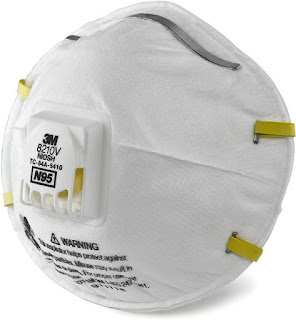You should just use an N95 mask that is certified by the
National Institute for Occupational Safety and Health (NIOSH). Search for the
NIOSH logo and the test and certification (TC) approval number on the mask or packaging.
Masks that are not certified by NIOSH may not give satisfactory protection to
you. Masks are commonly accessible from your local hardware stores or home
improvement places. If you are willing to buyN95 Face Mask at cheap rate, then contact a reliable company right away and
get it delivered shortly at your address by the professionals!
Use an N95 mask regardless of whether you can't see the
particles because they might be too little to even think about seeing. N95
masks don't protect you against chemical fumes, gases, carbon monoxide, fuel,
asbestos, lead, or low oxygen conditions.
Who Should Check with
a Healthcare Provider First
If you have any medical condition in the past, wearing a
mask may make breathing moretroublesome because you
should get air through the mask as you breathe in. People with known or
suspected breathing issues, emphysema, incessant obstructive pneumonic sickness
(COPD), asthma, or cardio/aspiratory issues ought to talk with their doctor
before utilizing one. If, whenever during the use of the mask, you experience
headache, nausea, dizziness or experience issues breathing, quickly leave the
area, evacuate the mask, get outside air, and seek medical attention if
necessary.
Instructions to Wear
the N95 Mask
Continuously peruse and follow the maker's headings when
utilizing an N95 mask. It must cover both the nose and mouth to shield you from
breathing in mold and dust. If it doesn't have a cozy fit, it won't work
appropriately. The right fit of the mask requires contact with smooth skin. It
won't work appropriately for people with whiskers or facial hair. Indeed, even
one-day facial hair development has been appeared to let air spill in.
Continuously use the two straps on the mask to hold it set up to shield air
from spilling around it.
Step by step
instructions to Make Sure the Mask Fits
Do a user seal check, including both positive and negative
pressure checks, to confirm that you have effectively put on the mask and
balanced it to fit appropriately.
Negative pressure check
Spot
two hands totally over the mask and breathe in pointedly. Be mindful so as not
to upset the situation of the mask. The mask should maneuver into your face. On
the off chance that air spills around your face or eyes, alter the nosepiece
and straps and rehash the positive pressure check.
Positive pressure
check
Put your hands over the mask and inhale it out strongly. If
your mask has an exhalation valve (like the one presented above), make certain
to cover the exhalation valve when you breathe out. No air should spill out of
the mask on the off chance that it fits appropriately. If air spills out,
re-alter the nosepiece and straps and rehash the negative pressure check.

No comments:
Post a Comment